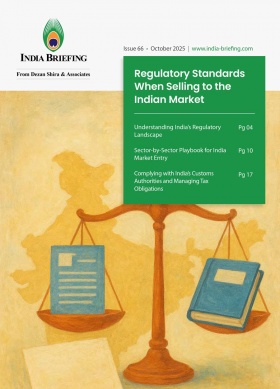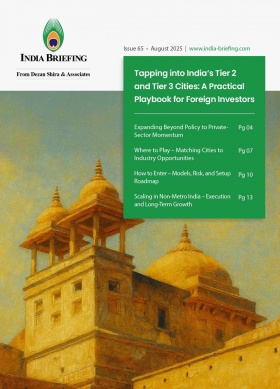RBI 2025 Draft Rules: New Framework for Foreign Branch and Office Setup in India
India’s new 2025 RBI draft regulations overhaul how foreign companies establish branches or offices in the country. Learn how the streamlined approval routes, simplified eligibility rules, and strengthened compliance requirements affect market entry and long-term operations.
India continues to modernize its foreign exchange management regime to keep pace with a more dynamic investment environment. The country now emphasizes a principle-based regulatory approach that offers clearer rules and greater operational flexibility. On October 3, 2025, the Reserve Bank of India (RBI) took a major step in this direction when it released the draft Foreign Exchange Management (Establishment in India of a branch or office) Regulations, 2025. The draft replaces the 2016 framework and sets out a simpler, more coherent structure for foreign entities seeking to establish a presence in India.
The proposed rules streamline establishment procedures, reduce administrative friction, and improve coordination between foreign companies and Authorized Dealer (AD) banks. They also introduce stronger security and compliance requirements, especially for entities operating in sensitive sectors or locations. Together, these measures support India’s broader goal of improving ease of doing business while maintaining regulatory oversight and safeguarding national interests.
Draft rules: Proposed structural changes and regulatory framework
The draft regulations redefine the establishment framework for foreign entities through a new category, Entity Resident Outside India (EROI), and consolidate all existing office types into two: Branch and Office. This shift reduces administrative complexity and provides foreign companies with a clearer framework for determining the appropriate mode of entry.
RBI also removes long-standing financial eligibility criteria, such as net worth thresholds and profit-track-record requirements. Foreign companies no longer need to meet the earlier minimum net worth levels (US$100,000 for branch offices and US$50,000 for liaison offices), which opens the door to a wider range of investors and business models.
The draft rules eliminate the old list of permissible activities and introduce a principle-based approach. Legal consultancy firms cannot set up operations, and Offices, other than Project Offices, cannot engage in commercial activities. Beyond these guardrails, entities must align their activities with sectoral regulations and the foreign direct investment policy.
Another important reform removes tenure limits for liaison offices. Under the 2016 framework, most liaison offices operated under a three-year cap, with shorter terms for certain sectors. The new regulations drop these restrictions, allowing companies to plan their India presence with greater flexibility and longer-term visibility.
These changes broaden market access for foreign entities, reduce compliance hurdles, and create a more coherent entry framework that reflects India’s forward-looking approach to foreign investment regulation.
Also Read: Establishing a Trading Company in India
Approval pathways under the draft regulations
The approval framework places routine applications with AD banks, enabling faster decisions and reducing the need for direct RBI involvement.
A second pathway, the Specific Approval Route, applies to cases with security, geopolitical, or sectoral sensitivities.
Foreign entities from Pakistan, Afghanistan, Bangladesh, Mainland China, Hong Kong, Macau, or Sri Lanka that plan to operate in Jammu & Kashmir, Ladakh, the Northeast, or the Andaman and Nicobar Islands must seek clearance from the central government.
The same requirement applies to non-profit organizations, entities with foreign government ownership, and businesses engaged in sectors such as defense, telecom, private security, and information and broadcasting, as well as any activity that falls under the Foreign Direct Investment (FDI) approval route. These categories reflect the government’s focus on national security and strategic-sector oversight.
Entities that already hold sectoral approvals or licenses from a relevant regulator may not need separate approval, which reduces duplication and brings greater clarity to the application process. This alignment between sectoral regulators and RBI supports a more coordinated compliance environment.
For foreign investors, the dual-route structure underscores the importance of early assessment. Companies must evaluate their ownership profile, planned activities, and intended locations to determine the correct approval pathway. This assessment guides timelines, documentation needs, and coordination with AD Banks and government authorities.
Compliance obligations for foreign entities
Foreign entities face a more structured compliance framework under the draft regulations, especially those operating in jurisdictions or sectors that raise security sensitivities. EROIs from Pakistan, Bangladesh, Sri Lanka, Afghanistan, Iran, Mainland China, Hong Kong, or Macau must complete security registration with State Police authorities and report their office and banking details to the Ministry of Home Affairs. These measures strengthen oversight while allowing legitimate investors to operate with clarity on their obligations.
Compliance also extends to banking operations. Branches and Offices must use non-interest-bearing INR current accounts, while Project Offices can open foreign currency accounts for project-related transactions. Offices, other than Project Offices, cannot undertake commercial activities, which aligns their operations with their intended representational role. Entities may place temporary surpluses in short-term deposits of up to six months, giving them limited flexibility in cash management.
Reporting remains a central pillar of the compliance framework. All entities must submit an Annual Activity Certificate (AAC) along with financial statements to their designated AD Bank and to the income tax authorities within six months of the end of the financial year. Project Offices must provide project-wise details as part of this submission. Non-submission within the allowed timeframe triggers account freezing and may lead to closure proceedings if the delay extends for three consecutive years.
Each entity must designate a nodal office to coordinate compliance and oversee additional places of business. AD Banks also carry expanded responsibilities, including monthly reporting to RBI on the establishment and closure of Branches and Offices and monitoring adherence to AAC deadlines.
These requirements underscore the need for disciplined internal controls and regular communication with AD Banks to ensure uninterrupted operations.
Procedure for establishment, expansion, and closure
The draft framework gives foreign entities a more streamlined process to set up and adjust their presence in India. Companies that need to operate from multiple locations no longer require separate approvals to expand. Entities can open additional places of business by notifying their AD Bank.
Exiting India also becomes more straightforward. An entity can voluntarily close a Branch or Office by sending an intimation to its AD Bank once it clears tax obligations and other statutory requirements. This shift removes the need for separate closure approvals and gives companies greater control over their exit timelines.
Compliance lapses, however, carry stronger consequences. Failure to file the Annual Activity Certificate (AAC) for three consecutive years triggers an automatic closure process. AD Banks must issue a notice and, if the entity does not respond within 30 days, proceed with closure and report it to the RBI, the Enforcement Directorate, and the Registrar of Companies (RoC). This mechanism ensures consistent oversight and discourages dormant or non-compliant operations.
RBI retains the authority to order closure when it identifies Foreign Exchange Management Act (FEMA) violations or activities that threaten public interest, national security, or India’s sovereignty. The draft regulations also introduce a clear appeal process. Entities can challenge closure orders within 45 days, appeals against AD Bank decisions go to the Chief General Manager of RBI’s Foreign Exchange Department, while appeals against RBI decisions go to the Executive Director overseeing the same department.
Rules on remittance remain tightly controlled. Branches and Offices can repatriate profits or winding-up proceeds after submitting the required documentation, including a chartered accountant’s certification and confirmations of tax and regulatory compliance. Once the entity completes the remittance, it must close its bank accounts and ensure that the AD Bank reports the closure to RBI.
Also Read: What Foreign Investors Must Know About India’s FEMA Regulations
Practical implications for foreign investors and outlook
Foreign companies planning to establish or expand their presence in India need to reassess their entry strategies in light of the draft regulations. Ownership structure, sector of operation, and intended geographic footprint now carry greater weight in determining eligibility and approval routes. Companies operating in regulated sectors or high-risk jurisdictions must plan for longer clearance timelines. Internal compliance systems also need review, particularly to manage AAC submissions, nodal office coordination, and security-related reporting.
A greater role for AD Banks accelerates routine applications and brings more predictability to documentation processes. This structure allows companies to focus more on strategic planning and less on navigating administrative hurdles. For many multinational firms, the streamlined framework offers a clearer pathway to building long-term operations in India.
Foreign entities must continue to align with India’s FDI policy and sectoral regulations and maintain disciplined compliance processes to meet reporting timelines and avoid operational gaps.
Looking ahead, the final regulations, expected after RBI reviews stakeholder feedback, could significantly reshape entry strategies for global companies evaluating India. The evolving framework supports faster establishment processes, greater operational clarity, and improved regulatory predictability. As India refines its foreign exchange management architecture, foreign investors benefit from a more predictable and business-friendly environment for expansion.
About Us
India Briefing is one of five regional publications under the Asia Briefing brand. It is supported by Dezan Shira & Associates, a pan-Asia, multi-disciplinary professional services firm that assists foreign investors throughout Asia, including through offices in Delhi, Mumbai, and Bengaluru in India. Dezan Shira & Associates also maintains offices or has alliance partners assisting foreign investors in China, Hong Kong SAR, Vietnam, Indonesia, Singapore, Malaysia, Mongolia, Dubai (UAE), Japan, South Korea, Nepal, The Philippines, Sri Lanka, Thailand, Italy, Germany, Bangladesh, Australia, United States, and United Kingdom and Ireland.
For a complimentary subscription to India Briefing’s content products, please click here. For support with establishing a business in India or for assistance in analyzing and entering markets, please contact the firm at india@dezshira.com or visit our website at www.dezshira.com.
- Previous Article Certificación BIS en la India 2025: Guía integral para fabricantes extranjeros
- Next Article FAQs: What Foreign Investors and Multinational SMEs Need to Know About India’s Industrial Relations Code, 2020












